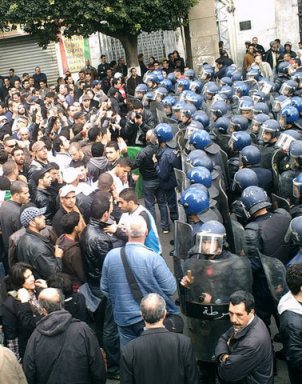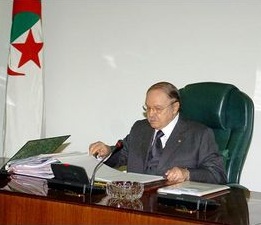|
Algeria Politics | Human rights Algeria protests risk losing momentum
Even before the Tunisian revolution, an Algerian pro-democracy protests movement was forming. In February, a newly formed National Coordination for Change and Democracy (CNCD) took charge of the protest movement, strongly inspired by the successes of protesters in Tunisia and Egypt.
In February, President Bouteflika addressed the principal demand of the new protest movement when he promised a lifting of the emergency laws that had been in place since 1993. Emergency rule was indeed lifted on 24 February. But President Bouteflika at the same time ordered a continued ban on protests in Algiers, referring to special threats by "terrorist groups" in the capital. Protesters were allowed to organise their marches in any place outside the capital - a move that allowed the regime to continue to meet protesters in Algiers with massive police violence. The Algerian government finally has managed to discredit the protest movement to a certain degree, with pro-regime media mostly referring to the protests as organised by the opposition parties being part of the CNCD. These parties are seen as sectarian by large groups of Algerians. Consequently, pro-democracy protests have become smaller during the last few weeks. The largest protest this month was organised in Algiers and Oran on Saturday 5 March, but were all outnumbered by police forces, violently dispersing the crowds of several hundreds and arresting several protest leaders. The protest movement - originally thought to have great potentials in an Algeria with rampant corruption an unpopular regime - still hopes to mobilise masses this weekend and in the weekends to come. But the movement risks losing its significance as it fails to find the key to ignite the masses. In a new attempt to regain momentum, a group of Algerian youths yesterday called for a new mass protest on Saturday 19 March. It is themes the "March of the Algerian Youth" and has a clear message to the CNCD and its members: "Political parties are not invited!" By staff writers © afrol News - Create an e-mail alert for Algeria news - Create an e-mail alert for Politics news - Create an e-mail alert for Human rights news
On the Afrol News front page now
|
front page
| news
| countries
| archive
| currencies
| news alerts login
| about afrol News
| contact
| advertise
| español
©
afrol News.
Reproducing or buying afrol News' articles.
You can contact us at mail@afrol.com









